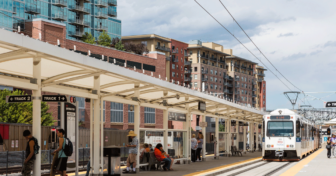
Now is the time to make fundamental change in the state’s economic development playbook. What we have been doing has not worked. Michigan’s per capita income has fallen from around the national average at the turn of the century to a record low thirteen percent below: falling from 18th in 2000 to 38th in 2022. Mid-course adjustment in what we have been doing is not the path to returning Michigan to high-prosperity: a place with a broad middle class.
More than anything else Michigan needs more high-wage jobs. Six in ten Michigan jobs pay less than what it takes to be a middle class household of three. Our research has taught us two fundamental lesson: (1) Talent is the most important asset to high-wage enterprises and (2) creating places where mobile talent wants to live is an economic development imperative.
So we are proposing that Michigan create, fund, and implement a Neighborhood Talent Concentration Initiative. Explicitly designed to generate more high-wage jobs by creating places where young talent wants to live and work.
The most consistent predictor of a state’s economic success is the share of its adults – particularly young adults – with a four-year degree. Where young talent goes, high-wage, knowledge-based enterprises follow, expand, and are created. The new path to prosperity is concentrated talent.
And because young talent is the most mobile, economic development policies should be squarely focused on creating the kinds of places where highly educated young people want to live and work. The data show that highly educated young people are increasingly concentrating in big metros with vibrant central cities that feature high-density, high-amenity, walkable, active street life neighborhoods. Every high-prosperity state that is not fossil fuels extraction driven has at least one big metropolitan area anchored by a vibrant central city where both the metro and the city have a high proportion of young adults with a BA or more.
Michigan is losing the competition for young talent, endangering the long-term health of our state economy and the economic well being of Michigan households. There are 14 percent fewer recent college graduates living in Michigan than graduated from Michigan institutions. California, Washington, Colorado, Texas, Minnesota, Illinois, Georgia, New York, and Massachusetts ––which all have large central cities filled with vibrant, dense neighborhoods–– are the only states with more recent college graduates living in the state compared to those who recently graduated from a state college.
Attracting and retaining highly-educated young people is the state’s primary economic
imperative. First and foremost retaining young talent that grow up here and then attracting
young talent from anyplace on the planet. The new economic reality is if we remain anywhere near minus 14 percent in the proportion of recent college graduates who choose to live here compared to those that graduated from here Michigan will be one of America’s low-prosperity states permanently.
To change this picture, we need to create more of the kinds of neighborhoods in our central cities that attract and retain young talent. These neighborhoods – our country’s talent magnets – vary in many ways, but all share common characteristics: they are dense, walkable, high-amenity neighborhoods, with parks, retail, and public arts woven into residents’ daily lives. The Neighborhood Talent Concentration Initiative will provide large grants to support the development of talent-magnet neighborhoods in Michigan’s central cities, at scale.
The overarching goals of the Neighborhood Talent Concentration Initiative is to:
- Address the economic development imperative of increasing Michigan’s population of young professionals and young skilled workers by creating high-density, high-amenity, walkable, vibrant street life neighborhoods or districts
- Create business ownership opportunities for local residents
The $500 million initiative will fund no more than twenty transformational public space development projects in central city neighborhoods or geographically concentrated districts. Priority will be given to cities with high potential of concentrating young professionals and young skilled workers at a large scale.
Projects supported by this initiative would be comprehensive neighborhood/district-wide plans, rather than discrete initiatives centered on a particular building or parcel, designed for walkability, density, vibrant street life and business opportunities for local residents. Eligible projects will assist and support existing businesses and to the extent possible protect existing local business investment and provide assistance for local resident business opportunities. Eligible projects will contain and support facilities that house or present cultural arts programs, performances, and exhibitions and on the streets presentations of cultural arts programs, performances, and exhibitions
Grantees will be community based not-for-profit organizations, though applicants would be required to partner with local government, philanthropy, relevant corporate and civic partners, and relevant community-based and not for profit organizations. Active involvement in the project planning by Generation Z is strongly encouraged.
Elements of a qualified neighborhood/district plan might include:
- Projects that alter the design and use of roads away from cars and towards pedestrian-friendly uses like walking, biking, shuttles/communal transit, and last mile options;
- Public art and cultural spaces;
- Parks, outdoor recreation, open spaces, and greenways;
- Commercial corridor activation, including innovative plans to fill vacant retail spaces with locally owned businesses and improve streetscapes;
- Transit projects, including rail and bus-rapid transit;
- Mixed-income housing
Simply funding the Neighborhood Talent Concentration Initiative is not enough. In addition to create these talent-magnet neighborhoods the Department of Transportation, MSHDA, MEDC, the Department of Natural Resources and the Michigan Arts and Culture Council must create and implement Neighborhood Talent Concentration Initiative Support Funds to provide funding for the relevant components of the selected projects.







